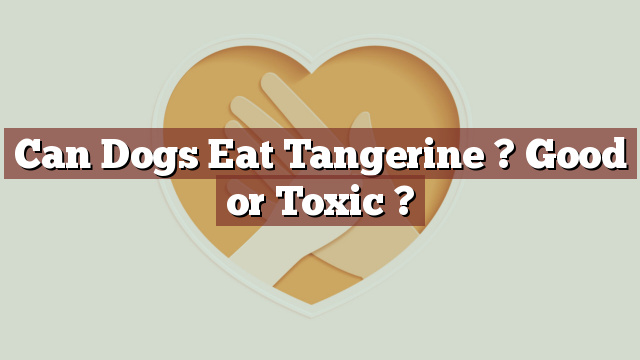Can Dogs Eat Tangerines? Good or Toxic?
As responsible pet owners, it is crucial to be aware of the foods that are safe for our furry friends to consume. While certain fruits may seem harmless, it is important to understand the potential risks and benefits they may pose to our beloved dogs. In this article, we will explore whether tangerines are a suitable addition to a canine’s diet.
Nutritional Value of Tangerines: Vitamins, Minerals, and Fiber
Tangerines are citrus fruits that are known for their sweet and tangy flavor. They are packed with essential vitamins, minerals, and fiber that are beneficial for our overall health. Tangerines are an excellent source of vitamin C, which boosts the immune system and aids in collagen production. Additionally, these fruits contain vitamin A, folate, potassium, and dietary fiber, which contribute to a well-balanced diet.
Can Dogs Eat Tangerines? Understanding Safety and Toxicity
Can dogs eat tangerines? Yes, they can! Tangerines are generally safe for dogs to consume, but moderation is key. However, it is crucial to remember that not all dogs may react the same way to tangerines. Some dogs may experience digestive issues, while others may have no adverse reactions at all.
Veterinary experts suggest that while tangerines are not toxic to dogs, they should be given in small quantities. The high citric acid content in tangerines can potentially cause an upset stomach or even diarrhea in sensitive dogs. The peel and seeds of tangerines should always be avoided, as they can pose a choking hazard and may contain harmful substances.
Potential Risks or Benefits: Digestive Issues and Allergic Reactions
While tangerines offer several health benefits, it is important to be aware of the potential risks they may pose to our furry companions. The acidic nature of tangerines can lead to digestive discomfort, especially if consumed in large quantities. Some dogs may also be allergic to citrus fruits, including tangerines, which can manifest as skin irritation, itching, or gastrointestinal problems. If your dog exhibits any allergic reactions, it is essential to discontinue feeding them tangerines and consult your veterinarian.
If Your Dog Eats Tangerines: Monitoring, Symptoms, and Veterinary Advice
If your dog accidentally consumes tangerines or exhibits any unusual symptoms after consuming them, it is crucial to closely monitor their behavior. Common symptoms of tangerine consumption may include vomiting, diarrhea, excessive drooling, or abdominal discomfort. If these symptoms persist or worsen, it is recommended to seek veterinary advice promptly. A veterinarian will be able to provide the necessary guidance and treatment based on your dog’s specific condition.
Conclusion: Moderation and Consultation for a Healthy Diet
In conclusion, tangerines can be a healthy and nutritious treat for dogs when given in moderation. They offer various vitamins and minerals that contribute to their overall well-being. However, it is important to be cautious and monitor your dog’s reaction to tangerines, as they can cause digestive issues or allergic reactions in some cases. If you have any concerns or questions about feeding tangerines to your dog, consulting with a veterinarian is always the best course of action. By doing so, you can ensure that your furry friend maintains a balanced and healthy diet.
Thank you for investing your time in exploring [page_title] on Can-Eat.org. Our goal is to provide readers like you with thorough and reliable information about various dietary topics. Each article, including [page_title], stems from diligent research and a passion for understanding the nuances of our food choices. We believe that knowledge is a vital step towards making informed and healthy decisions. However, while "[page_title]" sheds light on its specific topic, it's crucial to remember that everyone's body reacts differently to foods and dietary changes. What might be beneficial for one person could have different effects on another. Before you consider integrating suggestions or insights from "[page_title]" into your diet, it's always wise to consult with a nutritionist or healthcare professional. Their specialized knowledge ensures that you're making choices best suited to your individual health needs. As you navigate [page_title], be mindful of potential allergies, intolerances, or unique dietary requirements you may have. No singular article can capture the vast diversity of human health, and individualized guidance is invaluable. The content provided in [page_title] serves as a general guide. It is not, by any means, a substitute for personalized medical or nutritional advice. Your health should always be the top priority, and professional guidance is the best path forward. In your journey towards a balanced and nutritious lifestyle, we hope that [page_title] serves as a helpful stepping stone. Remember, informed decisions lead to healthier outcomes. Thank you for trusting Can-Eat.org. Continue exploring, learning, and prioritizing your health. Cheers to a well-informed and healthier future!

